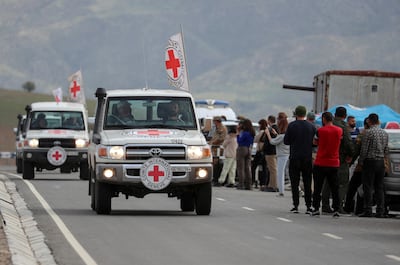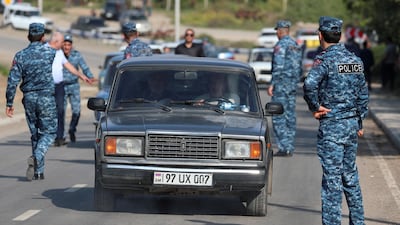Fears are growing that thousands of ethnic Armenians might flee the breakaway region of Nagorno-Karabakh following a short but bloody conflict, Armenia's Prime Minister has said.
Nikol Pashinyan has also blamed Russia, which has 2,000 peacekeeping troops in the region, for failing to ensure the security of Armenians, and accused Azerbaijan of “ethnic cleansing”.
But hopes of a more sustainable peace were raised after it was announced that Mr Pashinyan and Azerbaijani President Ilham Aliyev will hold a meeting in Spain next month.
The talks on October 5 in Grenada will include French President Emmanuel Macron, German Chancellor Olaf Scholz and European Council President Charles Michel, the Armenian security council said.
But it is still feared that many of Nagorno-Karabakh's 120,000-strong population could flee via the Lachin corridor to Armenia, creating a humanitarian and political crisis.
“If proper conditions are not created for the Armenians of Nagorno-Karabakh to live in their homes and there are no effective protection mechanisms against ethnic cleansing, the likelihood is rising that the Armenians of Nagorno-Karabakh will see exile from their homeland as the only way to save their lives and identity,” Mr Pashinyan said in a speech.
“Responsibility for such a development of events will fall entirely on Azerbaijan, which adopted a policy of ethnic cleansing, and on the Russian peacekeeping contingent in Nagorno-Karabakh,” he added.
He said the Armenian-Russian strategic partnership was “not enough to ensure the external security of Armenia”.

An adviser to the leader of the Nagorno-Karabakh Armenians also told Reuters on Sunday that the population would leave because they did not feel safe under Azerbaijani rule.
Russia acted as guarantor for a peace deal that ended a 44-day war in Nagorno-Karabakh three years ago, and many Armenians blame Moscow for failing to protect the region.
Russian officials have blamed Mr Pashinyan for his mishandling of the crisis, and have repeatedly said that Armenia, which borders Turkey, Iran, Azerbaijan and Georgia, has few other friends in the region.
But Mr Pashinyan has alleged that a coup is being plotted against his government, and accused Russian media of engaging in an information war against him.


